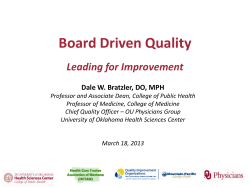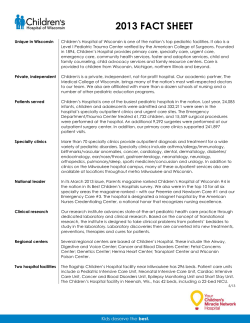
Healthy Wisconsin provokes healthy debate
Healthy Wisconsin provokes healthy debate By Jack E. Lohman Our health care system is not in a very good state. Doctors have given way to MBAs and the MBAs are about to give way to corporate CEOs and shareholders. Unless we do something soon to reverse this course, we are headed toward corporaterun medicine controlled by CEOs and shareholders who are more interested in profits than in patient care. The State Senate's Healthy Wisconsin (HW) plan is not perfect and it may not be your first choice, but it is a great starting point that addresses the fundamental systemic changes that are needed. It eliminates the 31% of waste that is created by the health insurance bureaucracy and spends it instead on patient care. It goes to hospitals, doctors and nurses instead of the insurance industry. It expands first-class care to the currently under-insured and uninsured, and it does so with the same dollars we are spending today. HW is not socialized medicine. It is a public-private system much like Medicare but it provides local control instead. A non-partisan board will be established to provide funding directly to health care providers without going through the insurance bureaucracy. Hospitals and physicians will remain private and independent, just as they are today. How to pay for it By now most business leaders know that the HW costs will be borne by a 10.5% tax on the employer's wage costs (up to the SSI cap of $97,500), which in most cases will be more than offset by the elimination of the 15% they pay for health insurance premiums today. Another 4% tax on wages is paid by the employee, which in most cases is offset by the additional coverage of vision, dental, mental parity, and prescription drugs they are paying out-of-pocket for today. But not everybody is happy with this, especially those businesses that currently provide no coverage or inadequate coverage. The Wal-marts and McDonalds of the world will have to step up to the plate and begin paying their fair share. Even Aurora Healthcare is third on the list of corporations whose employees receive taxpayer-funded BadgerCare. So no doubt these folks will oppose the new system. Healthy Wisconsin choices Citizens sign up for the service not through their employer but through HW contractors, likely at their own doctor or hospital. HW provides an individual patient choice between a health care network (HCN) and the traditional fee-for-service (FFS) care that’s been around for decades. Patients can select one or the other without affecting the choice of other employees or family members, which can be important when two different providers have skills in different areas. There are advantages and disadvantages to each approach, and HW will allow them to compete. This gives patients a choice and the public the opportunity to sort out the differences. In that sense it is consumer driven, but it does not force patients to price-shop down to the “per test” basis if they have chosen the HCN network. That level of scrutiny is left to the professionals in charge. But if you don’t like that, opt for the fee-for-service system and do your own price shopping. How the HCNs are paid HCNs would receive a fixed per-patient dollar amount from the state and thus have the financial incentive to keep costs low and their "spread" high. Spread is equivalent to profits in a for-profit company, but it is simply a surplus in a non-profit entity. In both cases it allows investments in new staff and technology and is thus a good thing if held within reason. Critics complain that the flat-fee incentive can work against the patient's best interest if expensive testing is needed, because it drives up costs but not revenues. But just the opposite is true of the fee-for-service arrangement, where revenues increase at a rate faster than costs. That’s an increase in profits and costs to the system. FFS is legitimately blamed for at least some of the medical inflation because physicians are paid for what they do whenever they do it. With FFS there is the opposite incentive to overutilize expensive medical procedures, especially when the physician owns the lab or equipment and the profits are his. For example, the FBI nailed a couple of cardiologists in Redmond CA for performing expensive and risky cardiac catherizations on virtually every patient that walked in the door. Overutilization can be as bad as underutilization because it can actually create health problems that didn't already exist. Conversely, there can be an incentive to underutilize when the physician is employed by a health care network, and in some cases receives a “production incentive” (which I believe should be disallowed). But here the so-called "market forces" will play out as patients select or deselect on the basis of perceived quality of care. Both systems rely heavily on the integrity and skills of the physician, but ultimately we’ll be able to measure medical outcomes through a common database. Medical mistakes often have a perverse affect on costs. While the HCN suffers losses from the additional corrective treatments, the FFS providers continue to be paid for the additional services that they themselves caused. As a result, HCN's are more likely to monitor or discharge the lesser skilled physicians, whereas FFS physicians are usually self employed and have nobody watching over them. Other physicians may avoid them, but patients are left unaware. At the very least the FFS program needs to be updated. The once-effective Certificate of Need (CON) program must be reestablished and physicians must not be allowed to “self refer” patients to their own testing lab, or for that matter, to hospitals they are employed by. At one time these practices were considered to be fraudulent and were disallowed, and those practices should be disallowed. In time I'd like to see healthcare morph into a totally taxpayer-funded service, because we are paying for it anyway in the price of goods and services and we’re driving companies out of the United States. There is absolutely no reason why we should burden businesses who must compete with foreign companies that do not have health care built into their product prices. But I digress. Actually, sending patients to independent hospitals worked quite well in years past, and we should return to that process. Physicians can also have their patients tested at qualified independent labs, creating a strong competitive pressure on entrenched hospitals. Suffice it to say that we should improve HW and not let the small business dilemma delay progress on fixing Wisconsin's healthcare mess. Its exorbitant cost is driving jobs out of the state and the nation, Wisconsin companies out of business, and preventing entrepreneurs from starting new businesses. But let me also say this about so-called price competition: Aside from the HCN models under HW, independent labs offer about the only competition we'll ever see in the FFS health care industry. Low price among hospitals and physicians may only mean that a doctor has trouble attracting patients or a hospital may be skimping on technology or cleanliness. Americans typically will not seek out the lowest bidder when selecting healthcare providers for their loved ones, so the value of low price can work in reverse. Our state's economy can only be helped by this progressive move, but what matters most now is which political constituency comes forth with the most money, and so far the insurance and hospital industries have given seven times the campaign contributions as have the supporters of change. Your tolerance level for political money driving public policy may be low, but this is a fact of life in Wisconsin politics and only public funding of campaigns will reverse it. But that’s another story for another day. And I have a different concern. Physicians, hospitals, and HCNs should be paid very well and I do not want to squeeze the good ones out of business. In fact, I’d like to see 100% educational rebates for those physicians and nurses who finish at the top of their class, and a strong incentive for technician training. The alternative is not pretty Notably, HCNs will now be required to guarantee coverage and they’ll not be able to cancel the more costly patients, which the Blue Cross plans on the west coast have recently been charged with doing, and they will have to accept all enrollees . HW establishes a coverage floor but not a ceiling, thus employers or workers may opt to pay for more coverage if they like. Not all is perfect Most common is the (very legitimate) complaint by small business leaders who by necessity have sought coverage on their spouses plan, or they simply go without. Now they will be hit with a 10% tax on wages. Our politicians must find a solution that allows them to survive this much-needed guarantee of public health care, and perhaps the best way is to provide an offsetting small business tax break, which the Republicans should love. That can be their contribution. Actually, when you think about it, small businesses shouldn't pay taxes at all. They simply pass them on to the public and we reimburse them at the cash register, thus it becomes a regressive tax that affects lower income families more than the wealthy. That said, large corporations should pay taxes depending on factors that prompt good corporate citizenship, like the CEO-to-worker pay ratio, the ratio of local to outsourced jobs, etc. Our state’s politicians seem to be ignoring what will happen if we do nothing. It's a basic rule in life that he who owns the gold, rules. And today that's the businesses and their shareholders. Fortunately it’s not the insurance industry, or things could be a lot worse. Business leaders and shareholders are now demanding change -- and they own the gold so I expect they'll get it. Those not moving employees into high-deductible health savings accounts (HSAs) will be changing to managed care systems, or they'll become members of a business consortium that contracts its health care to the lowest bidder. HSAs are decent investment tools for the young and healthy and wealthy, but they are not a useful healthcare policy for the average family. Their salesmen will disagree with me. According to studies by the Rand and Kaiser Foundations, the high deductibles can deter care until it is more costly to treat or becomes untreatable. Mothers will opt to put food on the table before buying their blood pressure medicine, and then have a costly heart attack or stroke, or worse, die. Patients with hypertension were found to have a 10% higher death rate when high deductibles deterred the purchase of medicines. We can do better. Those who can afford HSAs can find other ways to invest their money, but those who can’t, must have a solid health care program. Unfortunately, some employers are using HSAs as a means to transfer their healthcare risk to employees, and this promises to backfire in time. Both unhealthy and unhappy employees are costly. The handwriting on the wall Business healthcare consortiums are already forming in Milwaukee and elsewhere, but too often they are just a hair above being uninsured when uncovered catastrophic diseases strike. Not even the insurance industry will like the current trend because, ultimately, they'll not be needed in this final “free market” system. Its best option is to see Wisconsin grow and benefit from the resulting new markets. FedEx moved on when Fax and eMail took over the overnight document delivery market, and it survived just fine. The insurance industry should learn from their experience. Doctors will not fare well either, as giant hospital chains buy up as many of the independent physician clinics as they can (though this practice should be stopped because it creates a conflict of interest). But physicians will soon become employed by a corporation nonetheless and likely with lower salaries, competing more with foreign doctors, and facing higher demands for production-line efficiency. Get used to the five-minute office visit, because there’s more to come. Nor will the hospital association like the new shareholdermanaged-care system as they are beat down in prices with nowhere else to shift costs. It is not a pretty picture ahead. The scare tactics have also begun, including the potential issue of unemployed people migrating to Wisconsin for care. In fact, unemployed workers already receive free health care through the Medicaid program in their own state, so waiting a year in Wisconsin would not benefit them. And illegal immigration should indeed be dealt with, but not through the process of denying health care to their families. Especially when many of those immigrants become employed and will be paying for their health care through their employer, and adding to the state's economy at the same time. Carried to its extreme, what would our economy do with five million additional empty homes on the market? Needless to say, this requires sensible handling. The whole story Opponents of Healthy Wisconsin like to label this a $15.2 billion tax increase, and they purposely ignore the elimination of the $17 billion Wisconsin corporations are now paying in health insurance premiums. That distortion, naturally, comes from health insurance companies and business associations that sell insurance to their members. They like the status quo. And beware, the dreadful words “government-controlled health care” are creeping in with a bang. In fact HW uses private health care networks, hospitals, physicians and clinics just as does Medicare and Medicare Advantage, and that particular "government-run" system is one of the most successful public-private ventures ever. Yes, Medicare's per- patient costs are higher because it almost exclusively covers seniors and end-of-lifers, the people private insurers mostly shun. But fold in the youngsters and the average becomes less than what we are spending today. And finally, for those who would like to utter the words "Canadian rationing and wait times," don't even go there. Healthy Wisconsin is not a Canadian system, it is better and it is properly funded. Sure Canada has wait times for non urgent procedures because they underfund their system. If they increased their funding by 10% (to 11% of GDP), they'd still be less costly than our 16% of GDP. Note, too, that Canada has zero wait times for urgent procedures, just like in the US. Yet with all of that, over 80% of Canadians prefer their system to ours. Canada's problem is funding, ours is systemic. Once we fix the "system" -- the mechanism of funding -- you can bet that we’ll continue funding it properly because our voters will demand it. Wisconsin could have a Cadillac system and cover 100% of the population if we'd just get rid of the 31% of the costs that are needlessly consumed by the insurance bureaucracy ….. and spend the money instead on patient care. While medical rose by 5% per year, health insurance premiums rose 87% since 2000, obviously to help recover industry losses from Katrina, Rita and Florida. Importantly, had the insurance industry not been a major campaign contributor we'd have fixed our health care system years ago. Its biggest single problem is the huge portion of total health care costs – about 31% when you include the extra billing personnel required by hospitals and clinics – that are consumed by the insurance and billing bureaucracy, all without ever providing direct patient care. Costs for marketing, broker sales commissions, actuarial costs, gatekeepers, high executive salaries, increasing shareholder profits, even the high costs of their lobbying and campaign contributions are passed on to the patient (and in most cases employers, who have been taking their jobs offshore to avoid the costs). We won't eliminate it all, but we will eliminate the needless portion. In the end this will be a political decision, as former Senator Joe Leean has stated so well. The Democrats want it and the Republicans don't, and -- as Mike McCabe points out -favoring their campaign war chests and the insurance industry that fills them. More importantly the majority of voters adamantly support Healthy Wisconsin, so we should see it either passed before the next election or a different political party in control of the Assembly in 2008. That's called forced term limits, and we need more of them. -- Lohman is a retired business owner from Colgate and is a founding member of www.BusinessCoalition.net. He authored "Politicians - Owned and Operated by Corporate America" and can be reached at jlohman@execpc.com. Comparison of Health Care Networks and Fee-for-service Method of payment Financial Incentive Effects of medical mistakes Physician Oversight Health Care Networks Flat per-patient fee Doing fewer tests increases spread Drives up HCN costs without increasing revenues Heavy, HCN can monitor and discharge poor physicians Fee-for-service Fee on each office visit and each medical test Doing more tests increases profits Gets paid the first time, plus all other times to correct the problem Virtually nonexistent, physicians work for themselves Here are Leean’s responses to criticisms of the Healthy Wisconsin Plan: "It is the largest tax increase in state history." Because the funding for the plan is assessed on payroll, it is collected as a tax. But the naysayers are neglecting to point out that the approximate $15 billion collected for this plan eliminates more than $15 billion currently paid by businesses and consumers in insurance premiums. "Families will have to change doctors." Not true. Families will have choices of health care provider networks just like legislators and other government and school employees. "This is a government-run program." Not true. This plan is governed by a board of trustees made up of representatives of large and small businesses, labor, education and agriculture with an advisory group from the health care provider community. "This plan is a last minute idea with no public scrutiny or input." Not true. Several groups including the committee I chaired have been working on this for over two years. Labor unions, business groups, health care providers, farmer organizations, senior citizen advocates, legislators, and the insurance industry have been part of these discussions. Furthermore, scores of forums, debates and news articles have covered this over the past year. "This plan does nothing to control the cost of health care." Not true. The plan includes co-pays and deductibles to discourage inappropriate use of health care. It also provides preventive care with no co-pays and addresses chronic disease management. As I stated earlier, I wish Republicans would work with Democrats to include co-insurance and funded Health Savings Accounts (HSAs) as my committee proposed in our health plan. "This plan destroys the practices of health care professionals and their relationship with patients." Not true. Health care professionals will probably not even notice a change except that everyone will now have insurance. "This will destroy Wisconsin's economy and drive away employers and jobs." Not true. Most businesses currently providing insurance will see an overall reduction in their health care costs. Businesses not currently providing insurance will incur increased costs but now both the owners and their employees will have affordable health care. For a printable version of this document go to http://tinyurl.com/29cfe2 Sources for the following: Joe Leean at http://tinyurl.com/yunecm and Mike McCabe’s article at http://tinyurl.com/29jno9 And this excerpt from former Republican Senator Joe Leean Republicans should quit obstructing health care reform Here are the positives of the Healthy Wisconsin Plan: Everyone is covered - that is why it is called universal. The existing provider networks are maintained - that is why it is different than the Canadian or European models. Every family may choose their own provider network - the same as state and many local government employees. Your insurance stays with you regardless of whether you change jobs or lose your job. The plan is governed by a board of trustees who will contract with the private sector for both administration and health care delivery - this is not a government health care program. The funding for the plan is collected from assessments on income and payroll - this makes it fair, administratively simple and verifiable. The plan provides affordable, comprehensive health care for every individual and family in Wisconsin not already covered by Medicare, Medicaid/BadgerCare, or in a state institution. This plan will reduce state and local government costs by hundreds of millions of dollars. These savings could and should be used for tax reductions at both the state and local level. Joe Leean is a former businessman and served as a Republican State Senator from Waupaca from 1984-1995.
© Copyright 2025





















